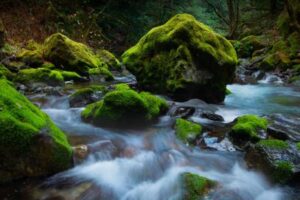There has been many a viral video featuring octopuses, usually starring the otherworldly creatures as they perform a feat of disturbingly intelligent problem-solving or physical resilience. Popular contenders have included these monstrous molluscs walking on land, letting themselves out of boxes, squeezing to freedom through impossibly small spaces and even unscrewing a jar from the inside. These videos have been received with playful (or genuine?) horror as we eye up our potential replacements. However, for all that they are intelligent, agile, dexterous and persistent, we have always known that these animals lack certain key elements for filling our shoes; the so-named ‘gloomy’ octopus is a solitary creature, only looking for company once a year to mate…or that’s what we thought. Our long-held idea of the wandering, lonely octopus, lacking a purpose or plan, was challenged in 2009 and has now been firmly shattered by a discovery south of Sydney in Jervis Bay; an underwater octopus city, whimsically dubbed ‘Octlantis’.
Octlantis is no accident; this is not a collection of octopuses (or octopodes, not octopi) simply happening to take shelter in a convenient rock formation – it is octopus-made, built out of a combination of exposed rock and beds of shells salvaged from eaten prey. Not only have these shells been used to create exterior walls to make a shelter, they also divide up separate shell-built dens within these walls. Octlantis’ residents are not huddling randomly together – they have purposefully constructed an area where they can enjoy private homes within a larger social structure. Sound familiar?
Whilst octopuses are far from the only creature to create a group living structure, they were previously thought to live separate lives, and have not demonstrated the same colony or pack mentality usually exhibited by such creatures. Yet, the residents of Octlantis act differently – observing marine biologists have seen complex social behaviour in play, including flirting and status negotiation through posturing and colour changes, and even organized den evictions.
Octlantis is not a one-off phenomenon – in 2009, a similar ‘city’ was discovered, again in Jervis Bay, by Matthew Lawrence. The complex nest, this time dubbed ‘Octopolis’, was formed around a large, man-made metal object on the ocean floor. Because of its man-man focal point, the discovery was thought to be an anomaly, but the new discovery of Octlantis has shown that this isn’t the case. It could be that in the right conditions, octopuses are learning to work together to create a mutually beneficial situation; both sites offer rocky outcroppings around an otherwise flat area, ideal for building.
Marine biologists have said that they don’t believe octopus behaviour has recently changed, so much as our ability to observe it, as we are now able to use GoPros to watch their interactions rather than intruding with human divers. Even so, the strange thing about these octo-cities is that, much like humans and other high-intelligence animals, this form of living is not the only choice octopuses are capable of making. Professor David Scheel, who led the research, described the behaviour in Octlantis as “remarkably similar to vertebrate complex social behaviour.” Peter Godfrey-Smith, author of Other Minds: The Octopus and the Evolution of Intelligent Life and diver at 2009’s Octopolis, further believes that these city structures could escalate the development of octopus intelligence and social behaviour, much as they did in early human development.
Could these cities be the start of Planet of the Octs, or are they simply evidence that there is still much we don’t understand about life on our ocean floors? Either way, their discovery is allowing zoologists rare opportunities to study these mysterious creatures in a new context, and potentially even watch as flies on the wall as their social structure develops in complexity. Whether these are the only two octo-cities in the world, or whether they are as widespread as our own, is still anybody’s guess, but one thing is for certain; the more we learn about the world, the more we realise we didn’t know.







